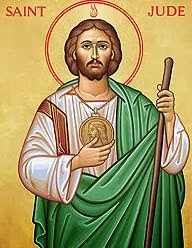By: Brian Chilton | September 14, 2017
Over the past few months, we have been examining the authors and background information for the books of the New Testament. For this article, we will examine a little book towards the end of the New Testament known as Jude. What do we know about this book and whom it was that composed it?
Author: Jude opens the book indicating that he is a “servant of Jesus Christ and a brother of James” (vs. 1).[1] The quest for Jude’s identity is intricately linked with the identity of James listed as Jude’s brother. One can easily eliminate James the son of Zebedee because he was martyred early in church history (Acts 12:1-5). The only other viable James is Jesus’ brother. When people at Nazareth were questioning Jesus, they asked, “Isn’t this the carpenter, the son of Mary, and the brother of James, Joses, Judas, and Simon? And aren’t his sisters here with us?” (Mark 6:3).
Mark 6:3 highlights a few facts. First, James and Jude were Jesus’ brothers. Second, they were both known by the church. If this is the case, then it stands to reason that Jude would identify himself as James’ brother since James was an influential leader in the Jerusalem church. Therefore, Jude the brother of James and Jesus is the most viable candidate to have authored this little book. Jude humbly designated himself only as the brother of James and a servant of Christ rather than elevate himself as Jesus’ brother.
Date: Jude is a difficult book to date. Since Jude deals with false teachings that had entered the church, one would think that a later date would be more feasible. However, the book does not discuss Gnosticism outright. Thus, many have postulated a date between AD 65 and 80. The most likely date is AD 68.
Purpose: By Jude’s own admonition, he had desired to write an encouraging letter about the believers’ common salvation to the “loved by God the Father and kept for Jesus Christ” (vs. 1). The beloved of God refers to the recipients who were most likely Jewish believers of the time. However, due to false teachings that had entered the church, Jude felt compelled to write a letter “appealing [them] to contend for the faith that was delivered to the saints once for all” (vs. 3).
Jude’s letter is a polemical letter warning believers to avoid false teachers. After giving the purpose for his letter in verses 1-4, Jude describes the apostates of the past and present time (vs. 5-11), the apostates’ doom (vs. 12-19), delivers an exhortation (vs. 20-23), before giving his benediction (vs. 24-25).
Connection of Jude with 2 Peter: Most unique to the book of Jude is its link with 2 Peter. Much of the content of Jude matches that of 2 Peter, including a quotation from the pseudepigraphical book 1 Enoch (vs. 12-13) and an allusion to the apocryphal book the Assumption of Moses. Did Jude borrow from 2 Peter, did Peter borrow for Jude, or did both borrow from a common source? Most likely, both Peter and Jude addressed similar issues facing the church at a time when heresy was challenging orthodoxy.
As shown previously in the article “Who Wrote the Letters of Peter,”[2] Simon Peter is a good candidate to have written 2 Peter. If 2 Peter borrowed from Jude, then the book would have been too late to have been penned by Simon Peter. If Peter is a good candidate for 2 Peter’s authorship, then either Jude borrowed from Peter or both borrowed from a common source. There are fewer problems stating that Jude borrowed from 2 Peter or that both borrowed from a common source. It is likely that since Jude borrows heavily from the Old Testament and Jewish tradition, he most likely borrowed some material from Peter’s second letter since it was received by the church in his day. Jude’s usage of 2 Peter indicates that by his time many of the NT books were being circulated and accepted as authoritative.
Notes
[1] Unless otherwise noted, all quoted Scripture comes from the Christian Standard Bible (Nashville: Holman, 2017).
[2] Brian Chilton, “Who Wrote the Letters of Peter?,” Bellator Christi.com (August 23, 2017), retrieved September 14, 2017, https://bellatorchristi.com/2017/08/23/who-wrote-the-letters-of-peter/.
About the Author
 Brian Chilton is the founder of BellatorChristi.com and is the host of The Bellator Christi Podcast. He received his Master of Divinity in Theology from Liberty University (with high distinction); his Bachelor of Science in Religious Studies and Philosophy from Gardner-Webb University (with honors); and received certification in Christian Apologetics from Biola University. Brian is in the Ph.D. program in Theology and Apologetics at Liberty University. Brian is full member of the International Society of Christian Apologetics and the Christian Apologetics Alliance. Brian has been in the ministry for over 14 years and serves as the pastor of Huntsville Baptist Church in Yadkinville, North Carolina.
Brian Chilton is the founder of BellatorChristi.com and is the host of The Bellator Christi Podcast. He received his Master of Divinity in Theology from Liberty University (with high distinction); his Bachelor of Science in Religious Studies and Philosophy from Gardner-Webb University (with honors); and received certification in Christian Apologetics from Biola University. Brian is in the Ph.D. program in Theology and Apologetics at Liberty University. Brian is full member of the International Society of Christian Apologetics and the Christian Apologetics Alliance. Brian has been in the ministry for over 14 years and serves as the pastor of Huntsville Baptist Church in Yadkinville, North Carolina.
© 2017. BellatorChristi.com.






[…] Por Brian Chilton […]